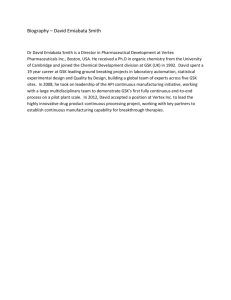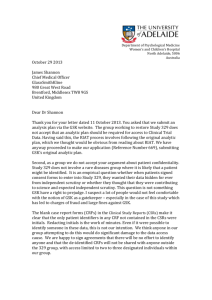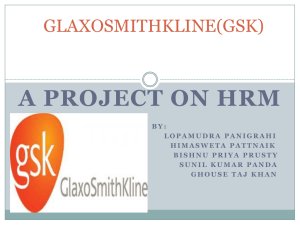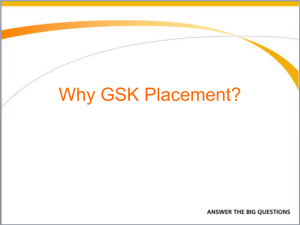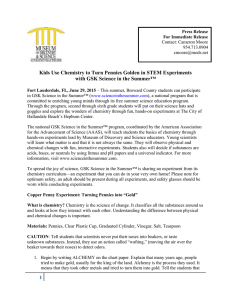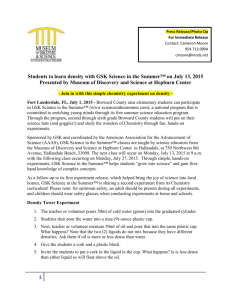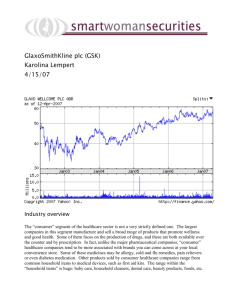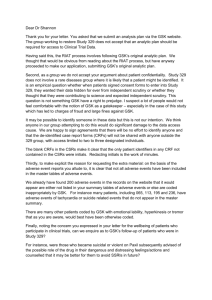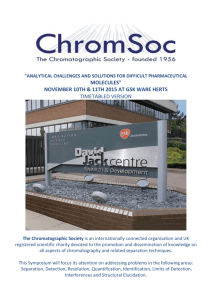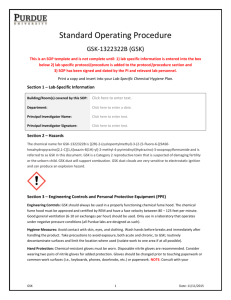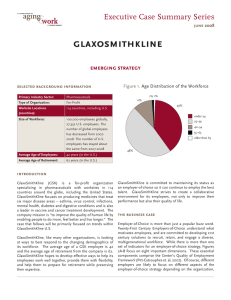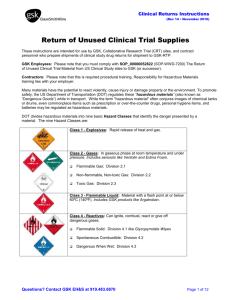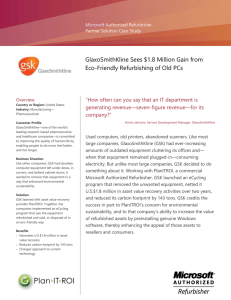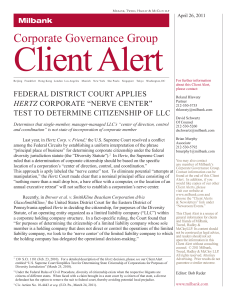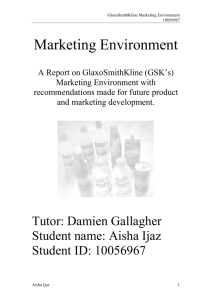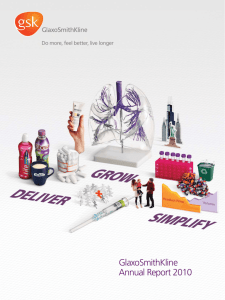DOC
advertisement
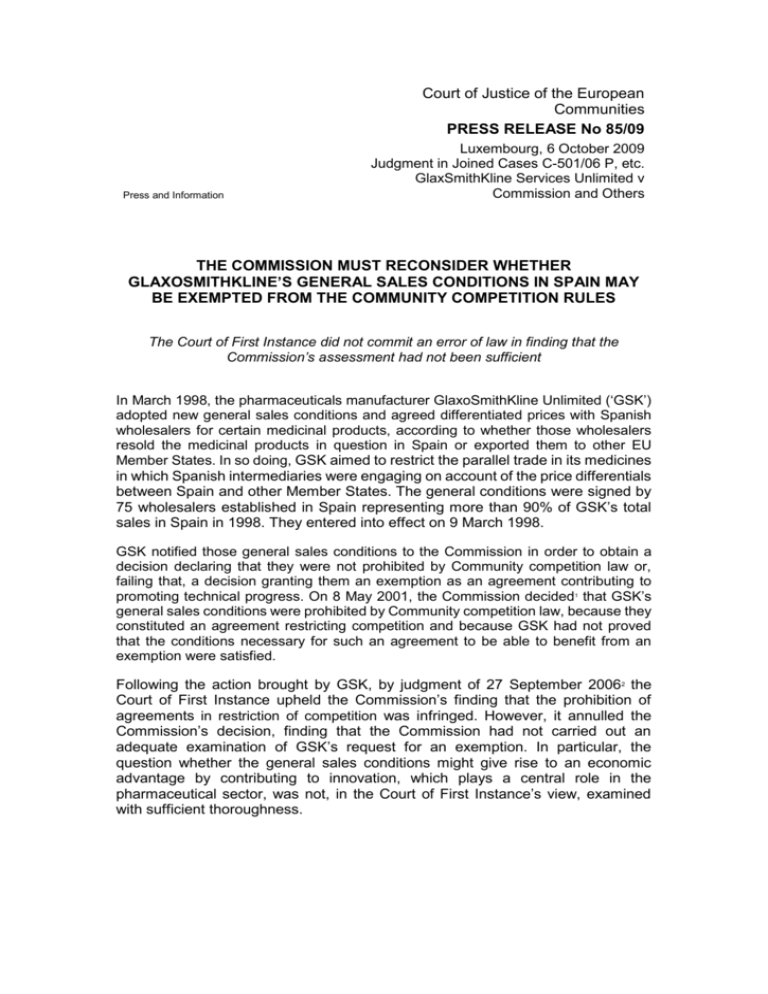
Court of Justice of the European Communities PRESS RELEASE No 85/09 Press and Information Luxembourg, 6 October 2009 Judgment in Joined Cases C-501/06 P, etc. GlaxSmithKline Services Unlimited v Commission and Others THE COMMISSION MUST RECONSIDER WHETHER GLAXOSMITHKLINE’S GENERAL SALES CONDITIONS IN SPAIN MAY BE EXEMPTED FROM THE COMMUNITY COMPETITION RULES The Court of First Instance did not commit an error of law in finding that the Commission’s assessment had not been sufficient In March 1998, the pharmaceuticals manufacturer GlaxoSmithKline Unlimited (‘GSK’) adopted new general sales conditions and agreed differentiated prices with Spanish wholesalers for certain medicinal products, according to whether those wholesalers resold the medicinal products in question in Spain or exported them to other EU Member States. In so doing, GSK aimed to restrict the parallel trade in its medicines in which Spanish intermediaries were engaging on account of the price differentials between Spain and other Member States. The general conditions were signed by 75 wholesalers established in Spain representing more than 90% of GSK’s total sales in Spain in 1998. They entered into effect on 9 March 1998. GSK notified those general sales conditions to the Commission in order to obtain a decision declaring that they were not prohibited by Community competition law or, failing that, a decision granting them an exemption as an agreement contributing to promoting technical progress. On 8 May 2001, the Commission decided1 that GSK’s general sales conditions were prohibited by Community competition law, because they constituted an agreement restricting competition and because GSK had not proved that the conditions necessary for such an agreement to be able to benefit from an exemption were satisfied. Following the action brought by GSK, by judgment of 27 September 20062 the Court of First Instance upheld the Commission’s finding that the prohibition of agreements in restriction of competition was infringed. However, it annulled the Commission’s decision, finding that the Commission had not carried out an adequate examination of GSK’s request for an exemption. In particular, the question whether the general sales conditions might give rise to an economic advantage by contributing to innovation, which plays a central role in the pharmaceutical sector, was not, in the Court of First Instance’s view, examined with sufficient thoroughness. GSK, on the one hand, and the Commission and two associations representing vendors of pharmaceutical products, on the other, all brought appeals before the Court of Justice, relying on different grounds of appeal. As regards the incompatibility of GSK’s general sales conditions with the prohibition of agreements in restriction of competition, the Court finds that, by requiring proof that an agreement entails disadvantages for final consumers as a prerequisite for a finding of anti-competitive object and by not finding that that agreement had such an object, the Court of First Instance committed an error of law. The Court also finds, however, that, despite that error of law, the Court’s of First Instance’s judgment remains well founded on other legal grounds. The Court of First Instance confirmed the part of the Commission’s decision by which it found that the general sales conditions infringed the prohibition of agreements in restriction of competition. Commission Decision 2001/791/EC of 8 May 2001 (OJ L 302 of 17.11.2001). Judgment of the Court of First Instance in Case T-168/01 GlaxoSmithKline Services v Commission, see Press Release No 79/06 . 1 2 Accordingly, the Court dismisses GSK’s appeal in so far as it seeks to establish that the general sales conditions were compatible with the prohibition of agreements in restriction of competition. As regards GSK’s request for an exemption, the Court states that the Court of First Instance rightly observed that, in order to be capable of being exempted, an agreement must contribute to improving the production or distribution of goods or to promoting technical or economic progress. That contribution is identified with appreciable objective advantages of such a kind as to compensate for the resulting disadvantages for competition. The Court further states that the examination of an agreement for the purposes of determining whether it contributes to the improvement of the production or distribution of goods or to the promotion of technical or economic progress, and whether that agreement generates appreciable objective advantages, must be undertaken in the light of the factual arguments and evidence provided by the undertaking in connection with the request for exemption. Such an examination may require the nature and specific features of the sector concerned to be taken into account if its nature and those specific features are decisive for the outcome of the analysis. Taking those matters into account does not mean that the burden of proof is reversed, but merely ensures that the examination of the request for exemption is conducted in the light of the appropriate factual arguments and evidence provided by the party requesting the exemption. The Court rejects in that regard the grounds of appeal put forward alleging a shift in the burden of proof. Lastly, the Court holds that the Court of First Instance did not commit an error of law with respect to the scope of its review of the Commission’s assessment. The Court of First Instance correctly held that the Commission had not taken account of all the relevant evidence produced by GSK regarding the loss in efficiency associated with parallel trade or the gain in efficiency procured by the general sales conditions, before concluding that the Commission’s decision was vitiated by a failure to carry out a proper examination. Consequently, the Court dismisses the appeals brought by GSK, the Commission and the two associations in so far as they concern GSK’s request for an exemption. Unofficial document for media use, not binding on the Court of Justice. The full text of the judgment is published on the CURIA website on the day of delivery. Press contact: Christopher Fretwell (+352) 4303 3355 Pictures of the delivery of the Opinion are available from " Europe by Satellite " (+32) 2 2964106
